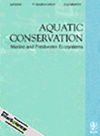Aquatic Conservation: Marine and Freshwater Ecosystems is an international journal dedicated to publishing original papers that relate specifically to freshwater brackish or marine habitats and encouraging work that spans these ecosystems. This journal provides a forum in which all aspects of the conservation of aquatic biological resources can be presented and discussed enabling greater cooperation and efficiency in solving problems in aquatic resource conservation. The publication of both practical studies in conservation as well as theoretical considerations of the underlying principles is encouraged. Contributions are accepted from as wide a geographical range as possible to ensure a broad representation of conservation issues in both developed and developing countries. The journal also publishes short communications review articles discussions and book reviews. Aquatic Conservation: Marine and Freshwater Ecosystems serves as a focus for scientists in research institutes universities industry nature conservation organizations and all levels of government as well as aquatic habitat and fishery managers and policy makers concerned with these issues. The subjects covered include the following topics: Theoretical principles underlying conservation. Survey surveillance and monitoring. Habitat and community classification. Assessment of conservation value. Status of endangered species communities and habitats. Management of habitats and communities. Water quality standards for nature conservation. Impact assessment (including exploitation of living and non-living resources aquaculture control of predatory species coast defence land claim waste disposal and pollution acidification forestry recreation shipping and navigation educational and scientific studies climatic change etc.). Creative conservation and rehabilitation. Conservation strategies - local regional national and international. Legal framework for conservation e.g. protected area and species. Inter-relationship of marine and freshwater ecosystems e.g. manipulation of river flows to estuarine and coastal waters for water resource management hydroelectric or tidal power.
